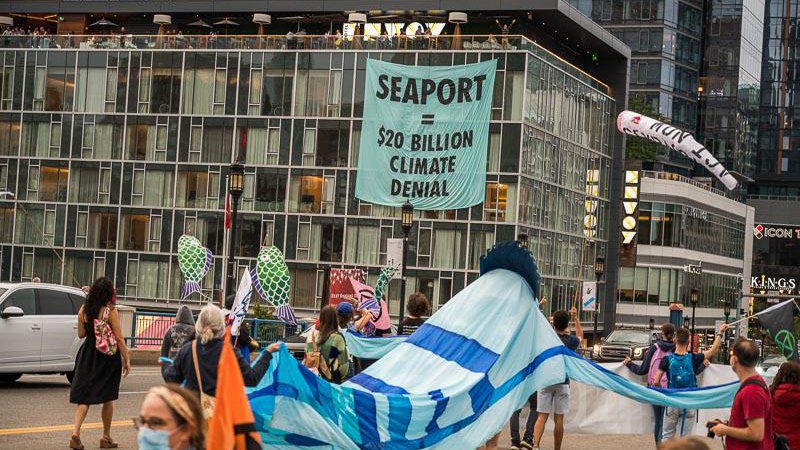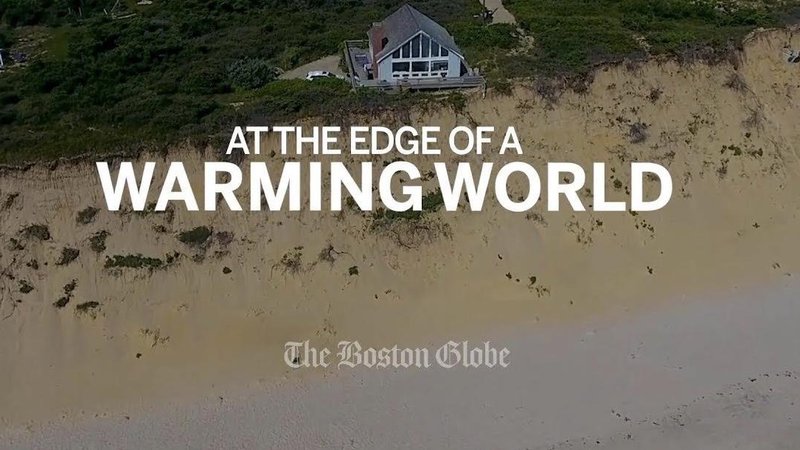
How is Climate Change affecting parks and nature around Boston?
Bostonians love our parks. Boston ranked 10th among the 100 largest U.S. cities for its public parks, per the latest report from the Trust for Public Land, a pro-parks not-for-profit. According to the Trust’s “ParkScore,” Boston scored a perfect 100 for access, 49 for acreage, 58 for amenities, 78 for equity, and 79 for investment. A perfect access score means that 100% of Boston residents live within a 10-minute walk of a park, whether it’s the Common, Franklin Park, or part of the Emerald Necklace. Boston’s access score stands well above the median average of 55% for all urban U.S. cities and towns.
Climate change is already affecting Boston’s outdoors, from the survival of natural life to the quality of human experience. The National Oceanic and Atmospheric Administration’s 2022 state climate summaries reaffirmed that New England is getting hotter faster than the rest of the country. Trees aren’t able to rapidly adapt to the extreme shifts in heat caused by climate change. This is causing certain species to die out, including sugar maples. “A hundred years ago, Concord was loaded with sugar maples along the road right here. In the past 100 years, they’ve actually been in decline because the temperatures have been rising,” said Joshua Fritz, a certified arborist with Hartney and Greymount.
Trees won’t be the only loss. A 2022 report from University of Massachusetts Boston found that “Under global warming, the waters south of Cape Cod may become too warm to support a lobster population. Warmer waters also promote shell diseases, parasites, and algal blooms that can damage important marine ecosystems and advance instability of coastal economic sectors.” This means that New England's historic lobster population, and economic systems based on it, will suffer.
Coastal flooding around the Boston area also puts trees at risk of illness and death from saltwater soil intrusion, while making waterfront parks unsafe and impassable. Moakley Park, Boston’s largest harborfront park, is a good example. Its waterfront location poses significant risks — to the park, adjacent neighbors, nearby infrastructure, and to several current and future redevelopment sites within a half-mile radius. Sea level rise projections predict a 21-to-40-foot rise within 50 to 60 years. At 40 feet, during a 1 percent storm (aka "100-year flood"), flood waters entering through the park will join two other flood pathways, catastrophically sending water deep into surrounding areas. Due to climate change sea level rise, our waterfront parks will sink under salt water, killing the plants, displacing the animal life, and removing those public lands from human use.
In addition to coastal flooding from sea level rise, Bostonians need to prepare for increased stormwater flooding. As the climate shifts, we can expect to see larger storms delivering more rainfall in a short amount of time to our city. These rapid and powerful storms overwhelm Boston’s storm drains, causing flash-flooding and impacting the city-wide sewer system. This results in more pollution in our waterways, underground flooding, and erosion. This pollution is devastating to underwater life, and the erosion degrades our soil health. Increased stormwater means that even Boston parks well inland are at risk of flooding, especially those that weren’t designed with adequate drainage.
Aside from flooding, climate change is already making it less safe for Bostonians to enjoy their parks. Assaulted by increased heat waves, parkgoers, especially children, are at increased risk of dehydration, heat exhaustion, and other negative effects. According to the Environmental Protection Agency’s “What Climate Change Means for Massachusetts” report from August 2016, “Rising temperatures may also increase the length and severity of the pollen season for plants such as ragweed. Certain people are especially vulnerable, including children, the elderly, the sick, and the poor. The risk of some diseases carried by insects may also increase. The ticks that transmit Lyme disease are active when temperatures are above 45°F, so warmer winters could lengthen the season during which ticks can become infected or people are exposed to the ticks.”
In general, unpredictable weather will make it hard to plan a park day, whether you’re dodging violent storms, wading through floodwaters, or carrying umbrellas and gallons of drinking water to survive the heat. Without full use of our city’s parks, children will have fewer safe options for entertainment and exercise. Low-income children in particular will suffer from the loss of free outdoor activities. Viruses like COVID19 will also spread more easily as human activities increasingly shift indoors to avoid the heat and water outside.
Climate change is truly an existential threat – it impacts every aspect of our life. Think of your memories of childhood birthday parties at picnic tables. Then add extreme heat, flooding, and threat of storms. Remember a long walk you shared with a loved one around a lake, but this time include dead fish poisoned by stormwater pollution washed up on the shore. We need our natural world, not only in the grander sense of interconnectivity, but also for the mundane grace of life in society. Children need to run in living grass and watch herons hunting in the marsh to understand what it means to be human in this world. We are responsible for giving them that opportunity, before it's too late.
There has truly never been a better time for climate action.
If you haven’t jumped into the fray yet, please sign up for an upcoming online XR Boston orientation. There is a place in the movement for everyone, and for all abilities. We need your voice to speak up for the sugar maples, for the lobsters, and for the children of Boston.
Related Stories:
Featured:
-
The third annual Week of Rebellion is full of opportunities for celebration and action!
-
Our government had the opportunity to finally turn our state into a "climate leader," and they decided yet again to prioritize profits and political posturing over the well-being of residents.
-
Prominent climate scientists and activists demand immediate climate action in the United States.
-
Stop the Fossil Fuel Industry, Now: List of events for Extinction Rebellion Boston's September week of rebellion
-
A compilation of books, movies, articles, and ways to take action to protect Black lives
-
Nadia Colburn, PhD and member of Extinction Rebellion Media team, discusses how to talk about the climate and ecological crisis with family and friends.
Upcoming Events:
-
Fri Feb 20th @ 6 p.m.
-
Sat Feb 21st @ 2 p.m.
-
Sun Feb 22nd @ 10:15 a.m.

